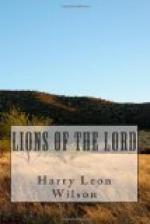“’For without shedding of blood there shall be no remission’—’but where are now your prophets which prophesied unto you, saying the King of Babylon shall not come against you nor against this land’—’But I say unto you which hear, Love your enemies, do good to them which hate you, bless them that curse you, and pray for them which despitefully use you.’ That is where the stain was,—the bloody stain that held the leaves together—but I tore them apart and read,—”
The Indian who had come to them first now appeared again over the ridge, and with him another. The second was accoutered lavishly with a girdle of brilliant feathers, anklets of shell, and bracelets of silver, his face barred by alternating streaks of vermilion and yellow, a lank braid of his black hair hanging either side of his face, and on his head the horns and painted skull of a buffalo. In one hand was a wand of red-dyed wood with a beaded and quilled amulet at the end. The other down by his side held something they did not at first notice.
The little man was growing weaker each moment, but still muttered as he turned restlessly on the blanket.
“’And as ye would that men should do to you, do ye also to them likewise.’” His quick ear detecting the light step of the approaching Indians, he sat up and grasped Follett’s arm.
“What do they want? Let no one come now. Death is here and I am going out to meet it—I am glad to go—so tired!”
Follett, looking up at the two Indians now standing awkwardly by them, said, in a low tone, with a wave of his free arm:
“Vamose!”
“Big medicine!” grunted the Indian who had first come to them, pointing to his companion. In an instant this other was before the sick man, chanting and making passes with his wand.
Then, before Follett could rise, the Indian’s other hand came up, and they saw, slowly waved before the staring eyes of the little man, a long mass of yellow hair that writhed and ran in little gleaming waves as if it lived. It was tied about the wrist of the Indian with strips of scarlet flannel—tied below a broad silver bracelet that glittered from the bronzed arm.
The face of the sick man had a moment before been tranquil, almost smiling; but now his eyes followed the hair with something of fascination in them. Then a shade of terror darkened the peaceful look, like the shadow of a cloud hurried by the wind over a fair green garden.
But with its passing there came again into his eyes the light of sanity. He gazed at the hair, breathless, still in wonder; and then very slowly there grew over his face the look of an unearthly peace, so that they who were by him deferred the putting aside of the Indian. With eyes wide open, full of a calm they could not understand, he looked and smiled, his wan face flushing again in that last time. Then, reaching suddenly out, his long white fingers tangled themselves feebly in the golden skein, and with a little loving uplift of the eyes he drew it to his breast. A few seconds he held it so, with an eagerness that told of some sweet and mighty relief come to his soul,—some illumination of grace that had seemed to be struck by the first sunrays from that hair into his wondering eyes.




